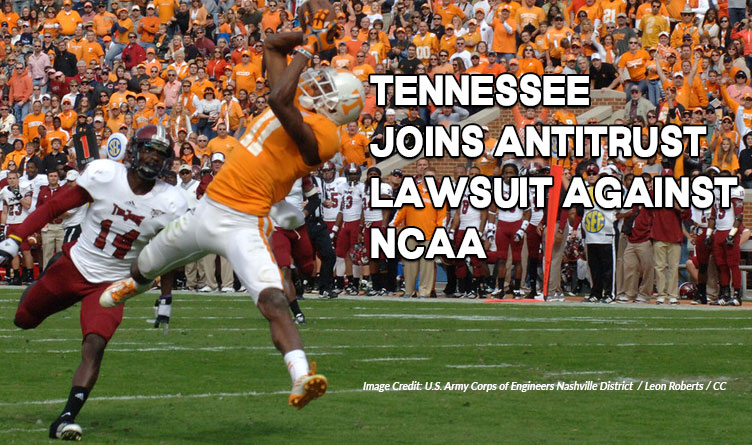Image Credit: U.S. Army Corps of Engineers Nashville District / Leon Roberts / CC
Press Release –
NASHVILLE – Tennessee Attorney General Jonathan Skrmetti fulfilled his duty in enforcing our antitrust laws by joining six other states in filing a federal antitrust lawsuit on behalf of the State of Tennessee, challenging the National Collegiate Athletic Association’s (NCAA) transfer eligibility rule in order to stop unlawful conduct that harms both collegiate athletes in Tennessee and consumers of Tennessee college sports.
The transfer eligibility rule requires college athletes who transfer between Division I schools to wait one year before competing in games, unless the NCAA waives the rule for a particular athlete. The NCAA began automatically exempting first-time transfers from the regulation in 2021, but has continued to enforce the rule for subsequent transfers and to deny waivers for no legitimate reason. The lawsuit is challenging the rule as an illegal restraint on college athletes’ ability to market their labor and control their education.

“College athletes deserve clear rules, consistently applied, so they can make the best decisions about their futures,” Attorney General Jonathan Skrmetti said.
As part of the multistate lawsuit, filed in U.S. District Court for the Northern District of West Virginia, the attorneys general are seeking a temporary restraining order and preliminary injunction to keep the NCAA from enforcing the rule.
Since its founding in 1906, the NCAA has expanded its rulebook beyond on-field contests to regulate off-the-field competition among its member institutions and manage the burgeoning business of collegiate sports. Some of these regulations are essential, the states’ lawsuit acknowledges, but “certain rules, lacking a clear procompetitive benefit, may run afoul of the nation’s antitrust laws, which are rooted in the belief that market forces yield the best outcomes.”
In justifying the one-year waiting period for second-time transfers, the NCAA cites the promotion of academic well-being and the preservation of athletic amateurism. But the suit calls the connection between the rule and these goals “pretextual”; notes that these purported goals can be accomplished through less-restrictive means that do not so significantly restrain the ability of our universities to compete; and argues that the harm it does to athletes and fans far exceeds any supposed benefits.

The one-year waiting period constitutes 20% of the total time allotted by NCAA regulations for the completion of a college athlete’s full eligibility – and, as such, could prove devastating for athletes seeking to optimize their career and welfare by transferring to schools that better suit them — something that all other students at our universities can freely do.
The NCAA often describes the college athlete experience as transformative, with competition playing a key role. Yet by preventing students from competing, it hinders the full realization of this experience. Additionally, previous applications of the rule have deprived our fans from seeing the best product on the field and will do so again in the future.
Tennessee is joining Ohio, Colorado, Illinois, New York, North Carolina, and West Virginia in this lawsuit. The lawsuit can be read here.





One Response
Athelets go to college to get an education , not engage in semi professional sports . They shoud not be paid to go to college to play football . Now granted , our colleges and universities are a joke anymore , but still …. they should not be controlled by sports and become the sole focus of such . The focus should be on education . Not a hot bed for spoiled atheletes to prance around regurgitating the sick marxist wokeism that many seem to prefer in our perverted universities. Let’s focus on education and not sports .Let’s go back to the way it used to be before evrything was about money !!!